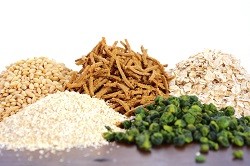Dietary fibres to boost the immune system
Fibre-rich food is considered beneficial for human health as high intake of certain dietary fibres has already been linked to lowering blood cholesterol and glucose levels. In addition to the diverse wellness benefits, studies have shown that non-digestible polysaccharides (NPS) can also help maintain a healthy immune system. Although the European Food Safety Authority (EFSA) has recognised the former health effects by approving claims for some specific fibres, further sound scientific evidence based on effects on healthy individuals is needed before approving claims that polysaccharide fibres can also boost the immune system. Researchers from industry and institutes collaborated in the EU-funded FIBEBIOTICS project in an effort to develop standardised practices, validate biomarkers and conduct clinical trials to help create products that are able to pass the EFSA assessment. The project enlisted four universities, five research institutes and eight ingredients companies. The work focused on the effect of NPS on enhancing immune defence against pathogens, increasing the gut barrier function and reducing infectious diseases such as the common cold and influenza. Nutrition, gut microbiota and immune responses Uncovering the mechanism of how polysaccharide fibres interact with the gut and immune cells found in the intestine was a major research pillar according to FIBEBIOTICS’ project coordinator Jurriaan Mes. Researchers developed in-vitro screening methods to compare different NPS for their bioactivity towards gut and immune cells. Using small intestinal epithelial cells and macrophages, the project team found that NPS can activate immune-related genes such as NFkB and therefore secrete signalling proteins called chemokines to attract other immune cells to the place of action. Such an in-vitro assay can support product quality control when change occurs in product processing and can be used to check products for their claimed bioactivity. Dietary fibres play an important role in stimulating the growth of specific beneficial bacteria in the colon, leading to the production of short chain fatty acids that bring significant health benefits. Having thus engaged in another in-vitro study, the project team optimised and applied a simulated model of the human digestive system, called SHIME, and investigated changes to gut microbiota and metabolites when replacing starch by different types of NPS. Improving vaccination efficiency with NPS Scientists conducted a pilot trial on 240 elderly subjects (40 subjects per research arm) who received food intervention for 5 weeks. Some of the NPS included in this study were derived from yeast, shiitake mushrooms, oats, wheat, apple and a probiotic bacterium. As Mes explains: ‘To test the health effects of NPS, we just used the powder that contained purified NPS. These were put in sachets and people had to mix it with liquid and drink it. Using some of the NPS, we later produced biscuits, smoothies and cheese to see how NPS can be integrated in real fortified food products. ’ The heart of the FIBEBIOTICS project was the conduction of a five-week trial where healthy elderly people received an influenza vaccination combined with a food supplement containing the different types of NPS tested. Results regarding the vaccination efficiency showed that certain NPS boosted the vaccination response, opening up promising avenues for further research. Future impact In addition to offering a benchmark for better understanding immune-health biomarkers, FIBEBIOTICS can help prove company health claims that their fibre ingredients can really boost the immune system, or support other health effects, and can support in including the fibre in their food products with maintained bioactivity.
Keywords
FIBEBIOTICS, dietary fibres, immune system, non-digestible polysaccharides, gut barrier function, beta-glucans

